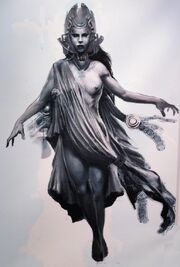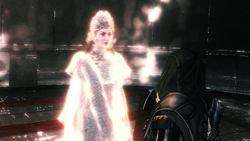
|
I will lead mankind into a new world! This article is currently being reworked by GuardDog in order to achieve a better status. We ask that edits to this article are only minor or grammatical in nature until this warning is removed, in order to not disrupt the major revamp. Should you wish to participate in the revamp, please contact the editor at work. |
Minerva, also known as Merva and Mera, was a member of the First Civilization.
Message in the Vault
Minerva appeared as a hologram figure within The Vault, and revealed little of the origin of humanity within her people's history.[1]
Minerva explained how humans came to be, what the Pieces of Eden were for, and why her people no longer control the humans, or even exist at all. She stated the purpose of the vaults built across the planet, and explained of the disaster that Earth once suffered. She referred to Ezio Auditore as the "prophet," and during most of her appearance, she spoke to someone Ezio could not see, thus confusing him. She then clarified that she was not speaking with him, but through him.[1]
Minerva apparently knew that Desmond Miles would one day relive Ezio's memories, as she seemingly addressed the camera (or Desmond's perception of the scene through the Animus) throughout her monologue, and concluded by saying, "the rest is up to you... Desmond," much to his ancestor's confusion. As Ezio tried to ask Minerva who Desmond was, her hologram disappeared, leaving Ezio with all of his questions unanswered.[1]
Trivia

The original concept art for Minerva.
- The original concept art for Minerva was shown in an international art exhibition showcasing artists work on the Assassin's Creed series.
- Minerva is the Roman goddess of wisdom, battle strategy, art, commerce, weaving among other things.[2] Minerva has Etruscan roots, linking her to Menvra,[3] another name Minerva mentions as one she was once known by. Minerva is equaled with the Greek goddess Athena in both characteristics and personality, as the Roman belief has been heavily influenced by the Greek mythology.
- Minerva is also one of the statuettes that can be collected and placed on a pedestal with her "partner" Jupiter, at the Villa Auditore.
- Minerva's knowledge of Desmond reliving Ezio's memories implies Those Who Came Before could foresee the future.
- Minerva's name root (Proto-Indo-European mn- and Latin men-) links her to memory, remembrance, or recollection, which is what her role is in the game (in helping the Assassins, or humanity, remember their past). This parallels Juno's role in her name, which means "to warn."
- Minerva mentions two others, Juno and Jupiter; they and Minerva are part of the Capitoline Triad.

Minerva speaking with Ezio Auditore in the Vault.
- In the novel Assassin's Creed: Renaissance, Minerva is seen in the vault with an owl on her shoulder. The symbol of the owl is frequently associated with the goddess Athena in ancient Greek architecture. Athena is the Greek counterpart to the Roman Minerva.
- Also in the novel, Minerva's speech to Desmond is replaced by her explanation of her existence to Ezio, with no mention of Ezio being a prophet.
References
- ↑ 1.0 1.1 1.2 Assassin's Creed II - In Bocca Al Lupo
- ↑ Wikipedia article on Minerva
- ↑ Wikipedia article on Menrva
| |||||||||||||||||||||||||||||||||||||
| |||||||||||||||||||||||||||||||||||||
| ||||||||||||||||||||||||||||||||||||||||||||||||||||||||||||||||||

